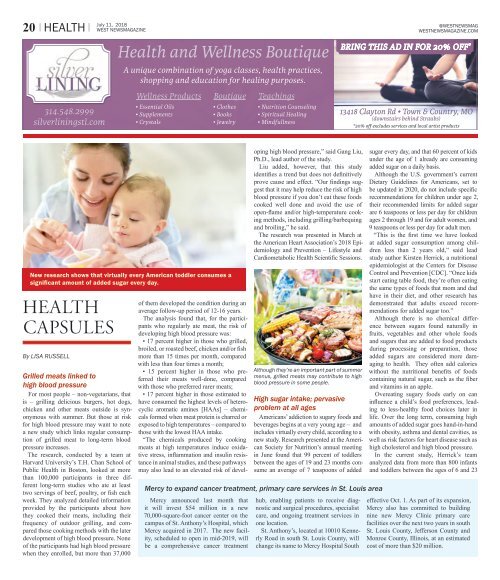West Newsmagazine 7-11-18
Local news, local politics and community events for West St. Louis County Missouri.
Local news, local politics and community events for West St. Louis County Missouri.
Create successful ePaper yourself
Turn your PDF publications into a flip-book with our unique Google optimized e-Paper software.
20 I HEALTH I<br />
314.548.2999<br />
silverliningstl.com<br />
July <strong>11</strong>, 20<strong>18</strong><br />
WEST NEWSMAGAZINE<br />
Health and Wellness Boutique<br />
A unique combination of yoga classes, health practices,<br />
shopping and education for healing purposes.<br />
Wellness Products<br />
• Essential Oils<br />
• Supplements<br />
• Crystals<br />
Boutique<br />
• Clothes<br />
• Books<br />
• Jewelry<br />
Teachings<br />
• Nutrition Counseling<br />
• Spiritual Healing<br />
• Mindfullness<br />
@WESTNEWSMAG<br />
WESTNEWSMAGAZINE.COM<br />
BRING THIS AD IN FOR 20% OFF *<br />
134<strong>18</strong> Clayton Rd • Town & Country, MO<br />
(downstairs behind Straubs)<br />
*20% off excludes services and local artist products<br />
New research shows that virtually every American toddler consumes a<br />
significant amount of added sugar every day.<br />
health<br />
capsules<br />
By LISA RUSSELL<br />
Grilled meats linked to<br />
high blood pressure<br />
For most people – non-vegetarians, that<br />
is – grilling delicious burgers, hot dogs,<br />
chicken and other meats outside is synonymous<br />
with summer. But those at risk<br />
for high blood pressure may want to note<br />
a new study which links regular consumption<br />
of grilled meat to long-term blood<br />
pressure increases.<br />
The research, conducted by a team at<br />
Harvard University’s T.H. Chan School of<br />
Public Health in Boston, looked at more<br />
than 100,000 participants in three different<br />
long-term studies who ate at least<br />
two servings of beef, poultry, or fish each<br />
week. They analyzed detailed information<br />
provided by the participants about how<br />
they cooked their meats, including their<br />
frequency of outdoor grilling, and compared<br />
those cooking methods with the later<br />
development of high blood pressure. None<br />
of the participants had high blood pressure<br />
when they enrolled, but more than 37,000<br />
of them developed the condition during an<br />
average follow-up period of 12-16 years.<br />
The analysis found that, for the participants<br />
who regularly ate meat, the risk of<br />
developing high blood pressure was:<br />
• 17 percent higher in those who grilled,<br />
broiled, or roasted beef, chicken and/or fish<br />
more than 15 times per month, compared<br />
with less than four times a month;<br />
• 15 percent higher in those who preferred<br />
their meats well-done, compared<br />
with those who preferred rarer meats;<br />
• 17 percent higher in those estimated to<br />
have consumed the highest levels of heterocyclic<br />
aromatic amines [HAAs] – chemicals<br />
formed when meat protein is charred or<br />
exposed to high temperatures – compared to<br />
those with the lowest HAA intake.<br />
“The chemicals produced by cooking<br />
meats at high temperatures induce oxidative<br />
stress, inflammation and insulin resistance<br />
in animal studies, and these pathways<br />
may also lead to an elevated risk of developing<br />
high blood pressure,” said Gang Liu,<br />
Ph.D., lead author of the study.<br />
Liu added, however, that this study<br />
identifies a trend but does not definitively<br />
prove cause and effect. “Our findings suggest<br />
that it may help reduce the risk of high<br />
blood pressure if you don’t eat these foods<br />
cooked well done and avoid the use of<br />
open-flame and/or high-temperature cooking<br />
methods, including grilling/barbequing<br />
and broiling,” he said.<br />
The research was presented in March at<br />
the American Heart Association’s 20<strong>18</strong> Epidemiology<br />
and Prevention – Lifestyle and<br />
Cardiometabolic Health Scientific Sessions.<br />
High sugar intake; pervasive<br />
problem at all ages<br />
Americans’ addiction to sugary foods and<br />
beverages begins at a very young age – and<br />
includes virtually every child, according to a<br />
new study. Research presented at the American<br />
Society for Nutrition’s annual meeting<br />
in June found that 99 percent of toddlers<br />
between the ages of 19 and 23 months consume<br />
an average of 7 teaspoons of added<br />
Mercy to expand cancer treatment, primary care services in St. Louis area<br />
Mercy announced last month that<br />
it will invest $54 million in a new<br />
70,000-square-foot cancer center on the<br />
campus of St. Anthony’s Hospital, which<br />
Mercy acquired in 2017. The new facility,<br />
scheduled to open in mid-2019, will<br />
be a comprehensive cancer treatment<br />
Although they’re an important part of summer<br />
menus, grilled meats may contribute to high<br />
blood pressure in some people.<br />
hub, enabling patients to receive diagnostic<br />
and surgical procedures, specialist<br />
care, and ongoing treatment services in<br />
one location.<br />
St. Anthony’s, located at 10010 Kennerly<br />
Road in south St. Louis County, will<br />
change its name to Mercy Hospital South<br />
sugar every day, and that 60 percent of kids<br />
under the age of 1 already are consuming<br />
added sugar on a daily basis.<br />
Although the U.S. government’s current<br />
Dietary Guidelines for Americans, set to<br />
be updated in 2020, do not include specific<br />
recommendations for children under age 2,<br />
their recommended limits for added sugar<br />
are 6 teaspoons or less per day for children<br />
ages 2 through 19 and for adult women, and<br />
9 teaspoons or less per day for adult men.<br />
“This is the first time we have looked<br />
at added sugar consumption among children<br />
less than 2 years old,” said lead<br />
study author Kirsten Herrick, a nutritional<br />
epidemiologist at the Centers for Disease<br />
Control and Prevention [CDC]. “Once kids<br />
start eating table food, they’re often eating<br />
the same types of foods that mom and dad<br />
have in their diet, and other research has<br />
demonstrated that adults exceed recommendations<br />
for added sugar too.”<br />
Although there is no chemical difference<br />
between sugars found naturally in<br />
fruits, vegetables and other whole foods<br />
and sugars that are added to food products<br />
during processing or preparation, those<br />
added sugars are considered more damaging<br />
to health. They often add calories<br />
without the nutritional benefits of foods<br />
containing natural sugar, such as the fiber<br />
and vitamins in an apple.<br />
Overeating sugary foods early on can<br />
influence a child’s food preferences, leading<br />
to less-healthy food choices later in<br />
life. Over the long term, consuming high<br />
amounts of added sugar goes hand-in-hand<br />
with obesity, asthma and dental cavities, as<br />
well as risk factors for heart disease such as<br />
high cholesterol and high blood pressure.<br />
In the current study, Herrick’s team<br />
analyzed data from more than 800 infants<br />
and toddlers between the ages of 6 and 23<br />
effective Oct. 1. As part of its expansion,<br />
Mercy also has committed to building<br />
nine new Mercy Clinic primary care<br />
facilities over the next two years in south<br />
St. Louis County, Jefferson County and<br />
Monroe County, Illinois, at an estimated<br />
cost of more than $20 million.

















